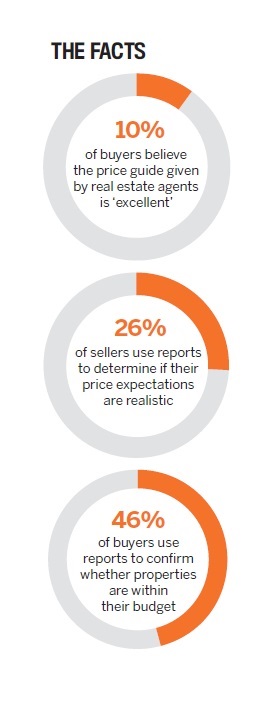5/72018
Nearly one in every two buyers looking for a new home these days is armed with a property report, and increasingly banks and mortgage brokers are providing their clients with property valuation data to help them get ‘buyer ready’.
But how much security does a property report really give you, and how far can you trust it? According to CoreLogic research, 46% of buyers are currently using property reports to help them understand if properties they are interested in are within their budget, compared to 26% of sellers who use them to understand if their price expectations are realistic.
Property reports are regarded as a valuable asset by buyers, who are overwhelmingly tired of the poor quality of price guides given by most real estate agents. Only 10% of surveyed buyers said the price guidance given by real estate agents was excellent.
If the guidance of property professionals cannot be trusted, buyers are doing their own research to make sure they are prepared.
Banks and mortgage brokers are capitalising on this lack of trust by providing reports as a way of moving up the value chain and creating stronger relationships with those likely to need a mortgage.
 But just because a property report is supplied by a bank, and just because data is used to identify a likely sale price or value, that doesn’t mean a property will definitely sell for the price stated in the report.
But just because a property report is supplied by a bank, and just because data is used to identify a likely sale price or value, that doesn’t mean a property will definitely sell for the price stated in the report.
A property report is a great guide, and it’s always sensible to do your own research. But guides reveal ‘logical prices’, which by their nature do not take into account the emotional nature of buying a property, especially in a sellers’ market. Property prices are never locked in stone – and nearly every buyer has a story about attending an auction where the quoted price guide was used as the starting point for bidding, with the final price being much, much higher. Doing your own research and having a property report in hand doesn’t protect you from any of this behaviour.
It doesn’t guarantee that bidding will stop when the price quoted in the report is reached, and it doesn’t mean that the property is obliged to sell for the amount stated in the advertisement. Equally, if the property sells for more than the report states because of lots of interest and strong bidding, it doesn’t mean the real estate agent has lied to you – just that normal market forces have come into play.
So use the reports to understand whether a property is worth in the vicinity of what you think it is, and to help you understand if your budget means it’s possible you could afford it.
But if market interest is strong, choose properties that have reported values that indicate the price is a little under what you’d like to spend. Then you’ll be more likely to find the bidding goes your way.

is the head of content and
property services marketing
at CoreLogic and runs the
